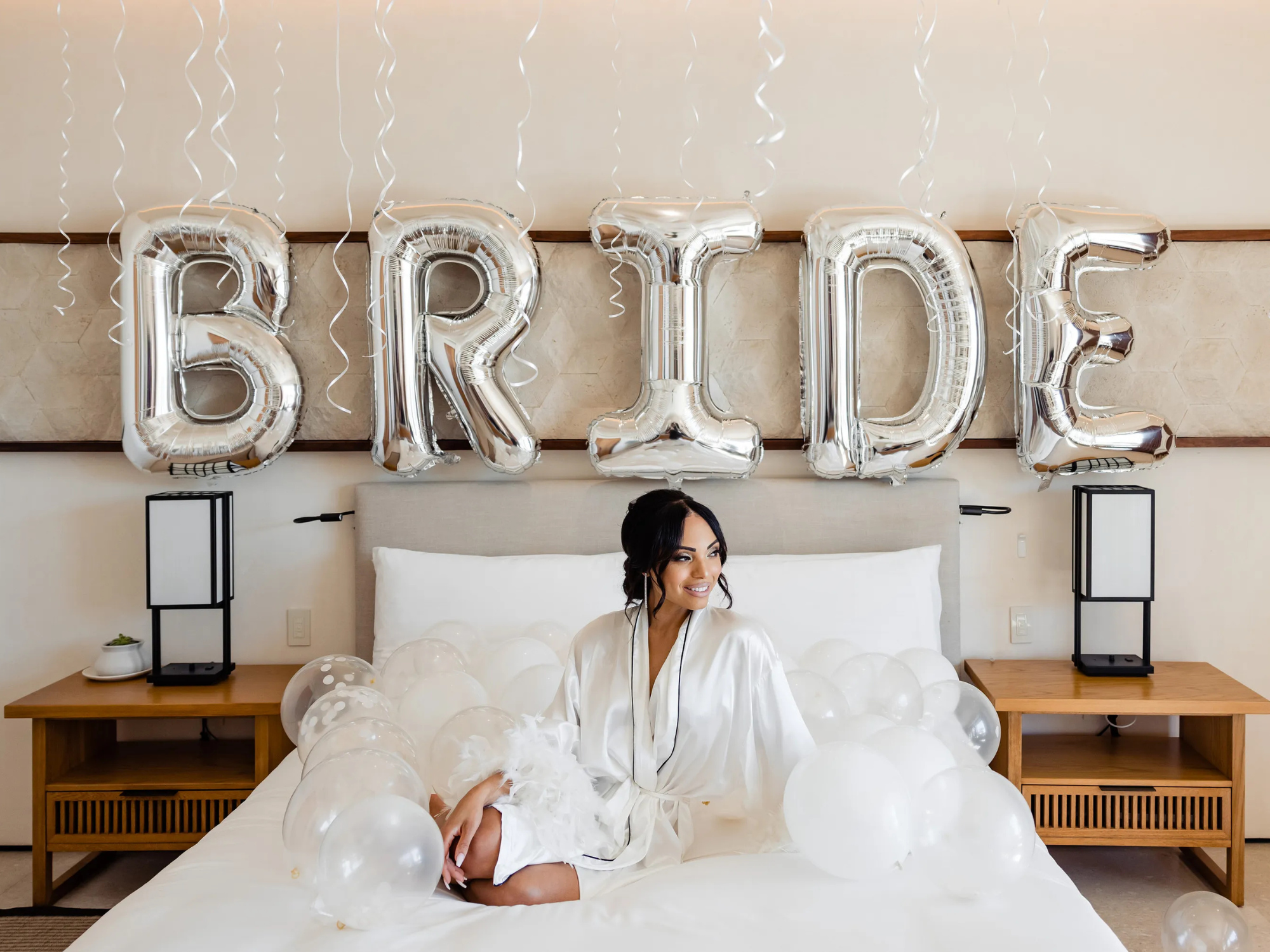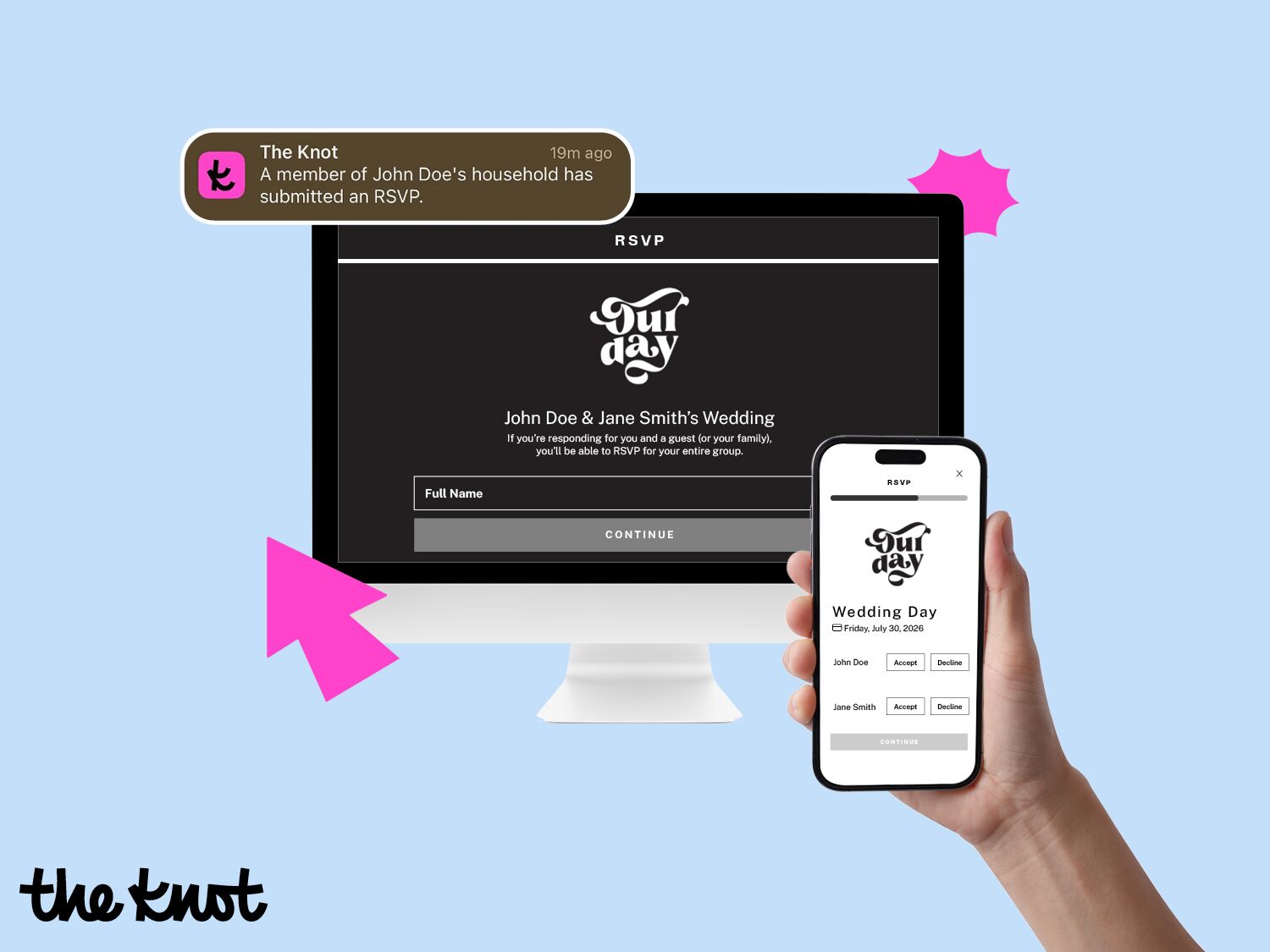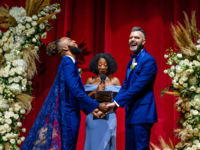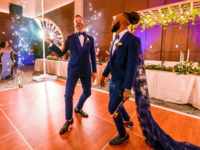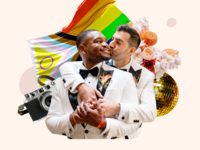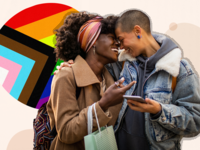Pride and Progress: A Look at LGBTQIA+ Weddings in the United States

This piece has been reviewed and fact-checked by Kirsten Palladino, an inclusivity consultant and the cofounder of Equally Wed.
Though the pursuit of inclusivity and progress requires enduring commitment all year long, it's helpful to pause regularly and take stock of the world we live in, and how couples, wedding guests and pros alike can work to create a more equitable wedding industry. Especially during June when Pride Month honors the 1969 Stonewall Uprising in New York, a pivotal moment in the fight for equality for the LGBTQIA+ community, reflection on how far we've come and what is left to do to support the LGBTQIA+ community is key.
Inside LGBTQIA+ Wedding Inclusivity: Definition | History | Current State of Affairs | Additional Steps to Take
Meet Our Experts
We tapped some of our favorite industry experts and wedding planners to get their take on the state of pride and progress.
- Brian A. M. Green of By BrianGreen: Brian A. M. Green is an Atlanta–based wedding planner with more than 15 years of experience whose eponymous business has been awarded Hall of Fame status in The Knot Best of Weddings Awards.
- Chanda Daniels of Chanda Daniels Planning and Design: Chanda Daniels is an expert wedding planner in the San Francisco Bay Area. The pro, who boasts more than 25 years of experience is the owner of both Chanda Daniels Planning and Design and A Monique Affair.
- Kirsten Palladino of Equally Wed: Kirsten Palladino is a wedding industry educator, author of Equally Wed: The Ultimate Guide to Planning Your LGBTQ+ Wedding, and an editor. In 2009, she and her spouse cofounded Equally Wed, an online wedding magazine dedicated to modern LGBTQIA+ weddings and inclusive vendors.
- Jason Rhee of Rheefined Company: Jason Rhee is a Los Angeles–based expert wedding planner. The pro, who boasts over 15 years of experience, is also a wedding industry speaker and educator.
- Jove Meyer of Jove Meyer Events: Jove Meyer is a New York City–based wedding expert who's been at the helm of his eponymous company for more than 17 years. In addition to planning wedding, the pro also regularly appears on national television to offer his event-planning advice.
The Definition of Inclusivity
Before understanding how far we've come, and where we hope to be in the future, we need a clear picture of the rubric against which progress is measured. In short: What does, or should, inclusivity look like? "Inclusivity means I feel welcomed, affirmed, celebrated and intentionally included," offers Kirsten Palladino. Along the same lines, Jove Meyer shares that "inclusivity means that all are welcome, included and celebrated equally despite their differences. Differences should be celebrated, not hated, especially as the differences we have are not choices, options or fads, they are part of who people are. Our differences are what make the world so beautiful and exciting!"
Green goes on to emphasize that diversity, equity and inclusion are not synonymous. However, in order to succeed in each arena, all three need to work together in a complementary way. "For me, inclusivity is just one piece of the pie," he explains. "Inclusivity without diversity and equity is like cooking a meal without all the spices and seasonings. Diversity is opening the space to different faces—inclusion is opening the space to different voices. Having a voice is vital to making changes in the world but we don't get to hear those voices without having diverse people present in the first place.
The History of Marriage Equality in the United States
While inclusivity is a beautiful concept many are fighting for, the United States has a fraught history in this realm. For startling context, Instagram was invented five years before federal marriage equality was legally embraced in this country. In short, we've come a long way, but have further to go.
The world owes a great debt to the activism work undertaken by Marsha P. Johnson and Sylvia Rivera in 1969. The activism work undertaken by Marsha P. Johnson and Sylvia Rivera in 1969 was a major catalyst for the LGBTQIA+ rights movement. The Stonewall uprising was a series of demonstrations that took place in response to a police raid of the Stonewall Inn in Greenwich Village in New York City—these protests are widely considered the watershed event that transformed the fight for LGBTQIA+ rights in the United States.
Brian Green shares, "When you think that just over 50 years ago two trans women of color stood up in New York City and said 'enough' to brutality and started the Stonewall riots—to today where we have marriage equality that allowed me to marry my husband—it's amazing. We now have a landscape of LGBTQIA+ characters in movies, media, in the highest places in business, politics, and government, serving in the military out and proud."
While the Stonewall uprising started a movement of progress, it was many years before broad legislative protections were made available to members of the LGBTQIA+ community. "It's incredible to think back about the progress made in our lifetime," shares Palladino. "I was just graduating high school when Bill Clinton passed DOMA, the Defense of Marriage Act. To go from that horror to just eight years later witnessing Massachusetts becoming the first state in the country to offer marriage equality was outstanding. But progress isn't fast."
It wasn't until 2015 when the Obergefell vs. Hodges Supreme Court case that all states were required to guarantee marriage licenses for all couples. However, the tenuous political climate in the country 11 years later is the reason that now, more than ever, champions of inclusivity cannot rest on their laurels.
"While I am grateful for progress for LGBTQIA+ people, I am also very nervous about the future of marriage equality and our general equal rights," confesses Meyer. "No one thought Roe v. Wade would be overturned, but here we are and with this court and the right's conservative agenda, our marriage protection is not far behind, sadly. Now is not the time to celebrate marriage equality, it is the time to speak up, stand up and keep fighting for full equal rights for LGBTQIA+ people and other marginalized people."
Current LGBTQIA+ Wedding Inclusivity
Even in an industry whose entire business is love, the road to progress hasn't been linear. As Green shares, "When I first started working in wedding planning and design, it was not legal for me to get married. It was so strange working to plan a person's wedding day—from wedding ceremony to wedding reception—when I could not access the same ritual and legal benefits myself. Now that marriage equality has been the law for years, children can see queer love from a young age, so they know what is possible and legal for them to have their own special day. Marriage equality helps normalize our love, it helps us feel like equal citizens in the place we live, work and love." Many of the wedding professionals we chatted with were heartened by the positive shifts they've seen in the industry and among engaged couples toward genuine inclusion and celebration of all couples and vendors.
LGBTQIA+ Weddings in the Media
As Green explains, media representation of the LGBTQIA+ community matters. "I just watched an incredible series on Netflix called 'Heartstopper,' which is the sweetest, kindest LGBTQIA+-show filled with inclusion and joy. That wouldn't have happened before. Having wedding publications feature LGBTQIA+ couples in their stories is incredible. All of that is progress."
Supporting Inclusive Wedding Vendors
While media plays a role in what people see, another important component of inclusivity in the wedding industry is which businesses couples are supporting with their wallets. Searching for vendors who align with your values is a great way to make your support of the LGBTQIA+ community actionable.
Rhee is especially excited by the social changes he's witnessed when it comes to business. "More LGBTQIA+ stories are being told in all media, and more talent is being discovered, appreciated, and elevated from diverse communities. Most importantly, it's no longer acceptable or profitable to be inequitable and future generations are demanding it."
The Knot is proud to be leading the charge in this area. At The Knot, we are committed to helping all marriers plan and celebrate a wedding that is uniquely their own. As part of that, we are committed to championing inclusivity surrounding sexual orientation, gender expression and gender identity. From the content we create to the tools we produce, we believe that love is love, and everyone deserves a wedding that authentically honors their relationship. Notably, all vendors listed on The Knot Vendor Marketplace must adhere to our nondiscrimination policy.
Steps to Take Toward Greater LGBTQIA+ Wedding Inclusivity
While there are many hard-fought progress milestones to honor, Meyer confesses that "slowly we are moving toward full equality, but it also feels like one step forward, two steps back." So, how can marriers and vendors alike take decisive action for good?
Working toward greater inclusivity:
- Support Transgender Inclusivity
- Pay Attention to Language
- Double-Down on Legal Advocacy
- Engage in Authentic Allyship
- Support Inclusive Pros
Support Transgender Inclusivity
Despite the pivotal role transgender folks as far back as Marsha P. Johnson have played in the fight for inclusivity, transgender rights are an area where continued focus and effort is warranted. Palladino stresses that "trans people are in danger in schools, athletics, places of work and worship, and on the streets. It's essential that anyone who supports trans rights to receive equal protection under the law show up for them in the polls, but also in their business. Sharing your inclusive values tells your clients the type of person you are and the type of experience they might have with you, but it also helps shift the tide of societal support. In the future, I hope that more people in society choose to be inclusive because it's the right thing to do but also because they feel it in their hearts, not just in their wallets."
Pay Attention to Language
"The words you use matter," emphasizes Green. "Asking and correctly using someone's pronouns is one of the most basic ways to show respect for their gender identity. When someone is referred to with the wrong pronoun, it can make them feel disrespected, and invalidated in their humanity."
However, pronouns are just the start. Green goes on to recommend that folks use "inclusive language in all aspects of wedding planning, including invitations, programs, and speeches. Avoid assumptions about gender, sexuality, or relationship dynamics, and use gender-neutral language whenever possible."
Double-Down on Legal Advocacy
As the unprecedented overturn of Roe v. Wade shows, Supreme Court rules may be stepping stones to progress, but they aren't the end all, be all. "Now that women's reproductive rights have been taken away, the risk of marriage equality coming next is even more scary and possible," admits Meyer. Green offers similar sentiments: "within the last two years, we have seen even more anti-LGBTQIA+ legislation and attacks. Just in the last few months, there have been too many trans women of color murdered and it is saddening." In short, now is the time to make your voice heard.
"The issues are too big to sit back and hope they get better," continues Green. "We, LGBTQIA+ members, and our allies need to stand up and speak out. As Martin Luther King Jr. said, 'darkness cannot drive out darkness; only light can do that. Hate cannot drive out hate; only love can do that.'"
Engage in Authentic Allyship
While some tasks need to be taken to the government, it's also paramount that each person take steps in their everyday lives to support the LGBTQIA+ community through authentic allyship. Hear me when I say this: The onus for inclusivity work doesn't fall on members of historically marginalized groups. Allies can and should make their support heard.
When I spoke with Green, he emphasized that allies should "always be aware of your privilege. Most of us have some form of privilege, aware or unaware, we have it. It can be your race, gender, class, education, being cisgender, or being able-bodied. Understanding that privilege doesn't mean that you have not had a challenging life, it means that there are some things you won't ever have to think or worry about just because of the way you were born. Understanding your own privileges can help you empathize with marginalized communities."
In addition to acknowledging the presence of privilege, Meyer emphasizes the importance of allyship as an active effort, "not a passive one. A real ally stands up for us in all aspects of life, and especially when it may be uncomfortable or unpopular. Being an ally is not just posting a rainbow flag and saying that you have LGBTQIA+ friends and or family members—it is marching with us and voting for those who are furthering equal rights. It is speaking out when hateful things are said or shared and not supporting companies that work to remove our rights. More than anything, it's about consistency in all areas of your life, be an ally at work, at home, with your family, with your friends, not just in front of us."
Support Inclusive Pros
According to The Knot Real Weddings Study, couples book an average of 14 different vendors to make their celebration a reality. That's 14 individual times you can speak with your money and support inclusivity.
The journey to supporting inclusive pros doesn't start with marriers, it starts with the pros themselves being vocal about their inclusivity. "It is 2024 and the onus is on pros to make it crystal clear that they support all couples in love," emphasizes Meyer. "Couples should not have to ask in fear or worry if a vendor would work with them, they should feel supported, welcomed and celebrated from the jump. So if it is not obvious I say move on, keep looking, as it is not worth the risk of being denied or turned away, especially while planning such a happy and love filled celebration! It is more important now, than ever, to be clear in your support and celebration of all love and couples!"
And once you do find pros you're eager to work with, Green encourages all to-be-weds to not shy away from transparency. "Having open and honest conversations about values, beliefs, and priorities for the wedding planning experience with vendors is essential," advises the pro. "This includes discussing their commitment to inclusivity and diversity and how they envision incorporating these values into their celebration and asking the vendor directly if their values align."
"The stakes are high for our rights, we need our allies now more than ever to do the right thing," reiterates Meyer. "Stand up for us, speak out for us and vote for us. Spend money in places that support us and be consistent in your efforts to support."

